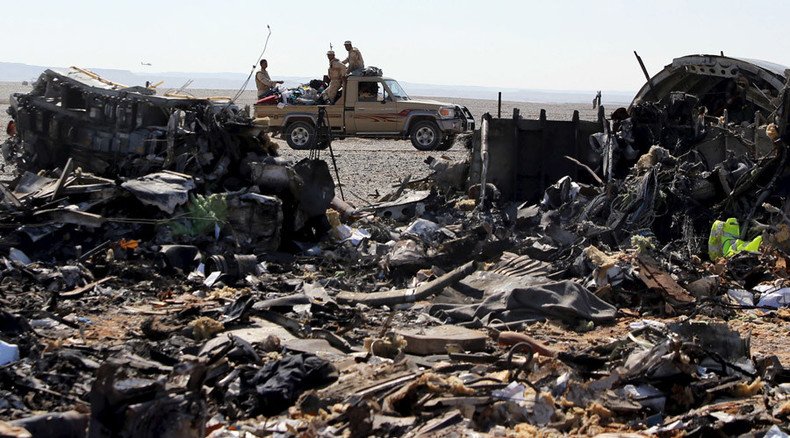Terror attack among possible causes of Sinai plane crash – Russian PM Medvedev

A terror attack is considered by the investigators as one of the possible causes for the crash of the Russian A321 jet over Egypt’s Sinai Peninsula in late October, said Russian Prime Minister Dmitry Medvedev.
“The possibility of a terrorist act, of course, remains among the reasons of what had happened" to the Kolavia flight 7K9268, Medvedev told Rossiyskaya Gazeta newspaper.
The PM stressed that the inquiry into the cause of the worst disaster in history of Russia’s civil aviation, which took the lives of 224 passengers and crew members, is “still ongoing.”
Russia’s presidential press-secretary, Dmitry Peskov, had said earlier that the international investigators from Russia, Egypt and other interested nations had not yet reached the preliminary conclusions on what caused the Airbus A321 crash.
#7K9268: St.Petersburg’s bells toll for each of 224 victims as new intel says bomb to blame https://t.co/9fLeZtHFX1pic.twitter.com/2EtG4ocVA7
— RT (@RT_com) 9 ноября 2015Egypt has launched its own separate investigation into the possibility of a bomb being planted aboard the Kolavia flight, a senior Egyptian official told BBC.
Airbus chief executive Fabrice Bregier also shed some light on the investigation, saying that it had so far failed to reveal any technical malfunction that could have led to the disaster.
Also on Monday, Israel said a terror attack was the “highest of probabilities” for the crash of the Russian airliner.
"We are not taking part in the investigation, but from what we hear and understand, I will be surprised if it turns out that this was not a terrorist attack whereby a bomb exploded inside the aircraft," said a spokesman for Israeli Defense Minister Moshe Yaalon.
It’s the first time Israeli officials publically commented on the possible reasons of the disaster since the crash, which took place on October 31.
Israel closely monitors the events in the neighboring Sinai, where Egyptian authorities are fighting various terror groups, including those affiliated with Islamic State (IS, also known as ISIS and ISIL).
However, Yaalon declined to comment on a CNN claim that Israel passed communication intercepts gathered in the Sinai at the time of the crash to US and British analysts.
80,000 Russian tourists still in Egypt to travel home separately from their luggage https://t.co/XaXYcizUlMpic.twitter.com/UrVHplZbh0
— RT (@RT_com) 7 ноября 2015Last week, Washington and London have voiced their intelligence assessments that the Russia plane was brought down by a bomb planted by the Islamists. The announcement led to mass cancellations of flights to Sinai’s Red Sea resorts, due to concerns over security at Egyptian airports.
Moscow urged its Western partners to wait for the results of the official investigation and slammed the UK for refusing to share intelligence data which led it to conclude the A321 was blown up.
On Monday, the Kremlin confirmed that the UK had shared “certain data” on the A321 crash with the Russian side.
Speaking at the UN headquarters, UK Secretary of State for Foreign Affairs Philip Hammond said that Britain couldn’t share all its intelligence on the issue due to “obvious reasons.”
Russia was among the countries to halt flights to Egypt and is now evacuating its citizens from the country.
"I think that we will be able to evacuate the majority of our holidaymakers over the next two weeks… but, if need be we’ll, of course, will continue to send planes to evacuate everybody,” Prime Minister Medvedev said.
The holidaymakers’ belonging will be delivered to Russia separately, Medvedev noted, calling it an “unpleasant” but necessary decision as “the properties of luggage are such that it doesn’t always get enough examination.”
LISTEN MORE:













